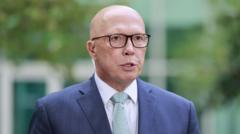The unexpected ban on wigs and skin-lightening products in Senegal's iconic theatre faced immediate backlash, leading to its swift reversal and igniting ongoing discussions surrounding gender, cultural nationalism, and personal freedom in the West African nation.
Senegal's Quick Wig Ban Sparks National Debate on Identity and Gender Politics

Senegal's Quick Wig Ban Sparks National Debate on Identity and Gender Politics
A brief prohibition on wigs and beauty products at Dakar's Grand Théâtre reveals deeper social tensions in Senegal concerning cultural identity and gender equality.
The recent ban on wigs and hair extensions at the Grand Théâtre de Dakar, enforced by the national culture ministry, was short-lived but has triggered significant uproar across Senegal. Initiated by the theatre’s director, Serigne Fall Guèye, the ban aimed to uphold "Pan-African values" and safeguard cultural integrity, but it quickly faced public criticism. Many viewed the directive as an assault on women's autonomy, with critics asserting that it represented a broader trend of patriarchal control masked as cultural activism.
Feminist leaders and civil society actors decried the ban, especially given the stark gender disparity in President Bassirou Diomaye Faye's administration, where women hold a mere four out of 25 positions. Critics pointed to the absence of a dedicated Ministry for Women as indicative of a deeper societal issue surrounding gender bias. The backlash was magnified on social media, where the restriction was called out as intrusive and rooted in a paternalistic ideology.
Guèye, despite being a vocal advocate for cultural resurgence through his previous role in the political sphere with the Pastef party, faced accusations of imposing his personal beliefs on a neutral public institution. Analysts emphasized that the controversy extends beyond mere hairstyles, illustrating a contest over who shapes national identity in a post-colonial context.
One noteworthy response came from Henriette Niang Kandé, a feminist commentator, who questioned the rationale behind restricting personal grooming choices, likening the ban to enforcing outdated norms relative to men’s beauty standards. While a minority supported the ban citing cultural pride, critics contended that Guèye’s approach simplified the complex issue of cultural identity, neglecting more pressing concerns such as language, education, and economic disparities.
Under intense pressure, Guèye quickly retracted the ban, attributing the decision to public misunderstanding; however, the implications of the controversy linger on. It has highlighted broader dissatisfaction among the urban youth and progressive factions disillusioned with the government’s perceived conservatism.
In a nation where beauty ideals, including skin-lightening practices, are fraught with health implications and societal judgment, the recent wig ban reflects a deeper struggle over personal freedom and self-determination. While the ban itself was revoked, the relevant discussions surrounding cultural authenticity, identity, and women's rights are far from resolved.
Feminist leaders and civil society actors decried the ban, especially given the stark gender disparity in President Bassirou Diomaye Faye's administration, where women hold a mere four out of 25 positions. Critics pointed to the absence of a dedicated Ministry for Women as indicative of a deeper societal issue surrounding gender bias. The backlash was magnified on social media, where the restriction was called out as intrusive and rooted in a paternalistic ideology.
Guèye, despite being a vocal advocate for cultural resurgence through his previous role in the political sphere with the Pastef party, faced accusations of imposing his personal beliefs on a neutral public institution. Analysts emphasized that the controversy extends beyond mere hairstyles, illustrating a contest over who shapes national identity in a post-colonial context.
One noteworthy response came from Henriette Niang Kandé, a feminist commentator, who questioned the rationale behind restricting personal grooming choices, likening the ban to enforcing outdated norms relative to men’s beauty standards. While a minority supported the ban citing cultural pride, critics contended that Guèye’s approach simplified the complex issue of cultural identity, neglecting more pressing concerns such as language, education, and economic disparities.
Under intense pressure, Guèye quickly retracted the ban, attributing the decision to public misunderstanding; however, the implications of the controversy linger on. It has highlighted broader dissatisfaction among the urban youth and progressive factions disillusioned with the government’s perceived conservatism.
In a nation where beauty ideals, including skin-lightening practices, are fraught with health implications and societal judgment, the recent wig ban reflects a deeper struggle over personal freedom and self-determination. While the ban itself was revoked, the relevant discussions surrounding cultural authenticity, identity, and women's rights are far from resolved.






















